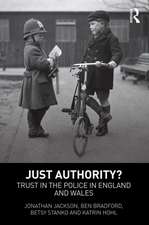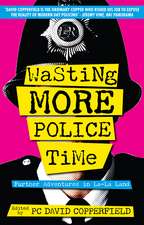The Future of Policing
Editat de Jennifer Brownen Limba Engleză Hardback – 9 oct 2013
Bringing together contributions from both key academic thinkers and police professionals, this book discusses new policing paradigms, lays out a case for an evidence-based practice approach and draws attention to developing areas such as terrorism, public order and hate crime.
Policing is too important to be left to politicians, as the health of a democracy may be judged by the relationship between the police and the public. The aim of this book is to question and present analyses of problems offer new ideas and propose realistically achievable solutions without being so timid as to preserve the status quo. It will be of interest to both academics and students in the fields of criminology and policing studies, as well as professionals in the policing service, NGOs and local authority organisations.
| Toate formatele și edițiile | Preț | Express |
|---|---|---|
| Paperback (1) | 388.20 lei 3-5 săpt. | +37.67 lei 7-11 zile |
| Taylor & Francis – 11 noi 2014 | 388.20 lei 3-5 săpt. | +37.67 lei 7-11 zile |
| Hardback (1) | 1562.04 lei 6-8 săpt. | |
| Taylor & Francis – 9 oct 2013 | 1562.04 lei 6-8 săpt. |
Preț: 1562.04 lei
Preț vechi: 1904.93 lei
-18% Nou
Puncte Express: 2343
Preț estimativ în valută:
298.93€ • 324.60$ • 251.10£
298.93€ • 324.60$ • 251.10£
Carte tipărită la comandă
Livrare economică 22 aprilie-06 mai
Preluare comenzi: 021 569.72.76
Specificații
ISBN-13: 9780415821629
ISBN-10: 0415821622
Pagini: 552
Ilustrații: 6 black & white illustrations, 19 black & white tables, 6 black & white line drawings
Dimensiuni: 156 x 234 x 30 mm
Greutate: 0.95 kg
Ediția:New.
Editura: Taylor & Francis
Colecția Routledge
Locul publicării:Oxford, United Kingdom
ISBN-10: 0415821622
Pagini: 552
Ilustrații: 6 black & white illustrations, 19 black & white tables, 6 black & white line drawings
Dimensiuni: 156 x 234 x 30 mm
Greutate: 0.95 kg
Ediția:New.
Editura: Taylor & Francis
Colecția Routledge
Locul publicării:Oxford, United Kingdom
Public țintă
Postgraduate and UndergraduateCuprins
Introduction, The challenges of contemporary policing, Part 1: Purposes, 1. Peel's principles, police principles 2. Policing: privatizing and changes in the policing web 3. Why do the police matter? Beyond the myth of crime fighting 4. What are the police for? Re-thinking policing post-austerity 5. Reinventing the office of constable: progressive policing in an age of austerity 6. Police futures and legitimacy; redefining good policing Part 2: Culture 7. Police culture and the policing context 8. Race and policing 9. Women police; potential and possibilities for police 10. A diversity stone left unturned? Exploring the occupational complexities surrounding lesbian, gay and bisexual police officers, The practice of policing, Part 3: Relationships 11. The police, policing and the future of the "extended policing family" 12. A blended model for the police-private provision of policing in England and Wales 13. Playing nicely with others: lessons from successes in partnership work for the police service 14. Beyond rhetoric: establishing academic-police partnerships that work Part 4: Delivery 15. From Sir Robert Peel to plts: adapting to liaison-based public order policing in England and Wales 16. Landscaping the policing of organised crime; some design reflections 17. The role of police in counter terrorism 18. Intelligence-led policing and the national intelligence model 19. Holding the line: the sustainability of police involvement in crime prevention 20. Hate Crime, Supporting policing, Part 5: Professionalising 21. The promise and perils of police professionalism, 22. The pursuit of professionalism: lessons from Australasia 23. The police as professional problem solvers 24. Police training and education: past, present and future 25. Leading by example: the untapped resource of first line police supervisors Part 6: Governance 26. Engaging the citizen 27. Making police accountable; governance and legitimacy 28. The rise and rise of independent police complaints bodies, 29. Ethics and policing 30. Great expectations and complex realities: assessing the impact and implications of the police reform process in Northern Ireland 31. Different and divergent trajectories? Reforming the structure, governance and narrative of policing in Scotland.
Recenzii
‘A comprehensive collection of essays provocatively and imaginatively probing all aspects of contemporary policing. The authors are a well-chosen, excellent mix of highly respected, well-established authorities and brilliant new talents, all writing at the top of their game, with lucidity, freshness, and panache. This book is the essential entry ticket for understanding and contributing with credibility to policing debates, and is vital reading for politicians, policy-makers, practitioners, researchers, academics and their students.’ - Robert Reiner, Emeritus Professor of Criminology Law Department, LSE, UK
‘Policing is always topical but never more so than today. Just when crime trends are declining, the police face daunting new challenges in securing public confidence, the support of policymakers, and the resources they need to do "the job". Jennifer Brown has assembled a genuinely stellar team of authorities on every dimension of policing’s contemporary dilemmas, who deliver a substantial step further in our evidence-based understanding of this vital field.’ - Nigel Fielding, Professor of Sociology, University of Surrey, UK
"…the breadth of research in this collection provides a wealth of insight and experience." - Sam Frost in The Howard League for Penal Reform
"There is much to be gained from a close reading of Brain’s book, not least a deeper understanding of the contours of the recent developments in policing, and the politics of policing in recent decades. As a former chief constable with academic credentials, Brain writes with authority and insider status. The certainty that characterises many senior police officers is evident, balanced with academic rigour and good style. The book, I predict, will be valued as much as a history and analysis of the present as a forecast of possible futures." — Rob C. Mawby, The Howard Journal
‘Policing is always topical but never more so than today. Just when crime trends are declining, the police face daunting new challenges in securing public confidence, the support of policymakers, and the resources they need to do "the job". Jennifer Brown has assembled a genuinely stellar team of authorities on every dimension of policing’s contemporary dilemmas, who deliver a substantial step further in our evidence-based understanding of this vital field.’ - Nigel Fielding, Professor of Sociology, University of Surrey, UK
"…the breadth of research in this collection provides a wealth of insight and experience." - Sam Frost in The Howard League for Penal Reform
"There is much to be gained from a close reading of Brain’s book, not least a deeper understanding of the contours of the recent developments in policing, and the politics of policing in recent decades. As a former chief constable with academic credentials, Brain writes with authority and insider status. The certainty that characterises many senior police officers is evident, balanced with academic rigour and good style. The book, I predict, will be valued as much as a history and analysis of the present as a forecast of possible futures." — Rob C. Mawby, The Howard Journal
Descriere
Bringing together contributions from both key academic thinkers and police professionals, this book discusses new policing paradigms, lays out a case for an evidence-based practice approach and draws attention to developing areas such as terrorism, public order and hate crime.











